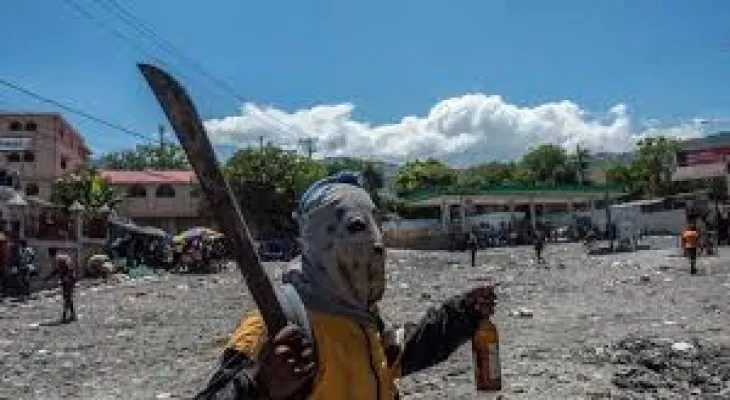Search here
Newspaper
Search here

Arab Canada News
News

Published: March 16, 2024
In a city silenced by gangs, everyone notices the noise of a helicopter flying overhead at night - a brief signal that a very lucky person managed to leave Port-au-Prince.
CNN was able to land in the Haitian capital by helicopter on Friday after days of sporadic plans that required detailed security arrangements and multiple levels of diplomatic approval.
Since its previous visit to Haiti by CTV News last month, the situation has deteriorated sharply. The besieged Prime Minister Ariel Henry announced his decision to resign, but it is unclear who will fill the void or when. The promised transitional government has not yet been formed, and the plans to establish a Kenya-led stabilization force have fallen into oblivion.
Ordinary people rarely leave their homes in Port-au-Prince these days, where daily battles between police and gangs lead to rising plumes of smoke in the air, with gunshots echoing in the quiet streets. The streets, usually crowded with cars and vendors, are empty, and the city’s painted taxis are rarely full.
There are few places left to go, and gangs have closed all roads leading out of the city, as well as access to the port; the city’s international airport has been closed, its walls riddled with bullet holes. Nothing comes in either. Food supplies have run out in the city’s grocery stores. Fuel stations are out of fuel. Hospitals suffer from a shortage of blood.
On Friday evening, gunfire was heard in the city hills. Down below, there was also a police operation underway in the area of notorious gang leader and former police officer Jimmy Cherizier, also known as Barbecue.
The United Nations is working to establish an air bridge between Port-au-Prince and Santo Domingo in the neighboring Dominican Republic to transport vital supplies to the city. But for now, the only thing reaching Port-au-Prince are private evacuation helicopters — a bitter ticket highlighting the stark disparity that has plagued Haiti for decades, where most people live on less than $4 a day.
Hundreds of people put their names on lists to flee Port-au-Prince by air, according to several pilots interviewed by CNN — a small category of wealthy foreigners and diplomats who have the resources and networks needed to consider chartering a private flight where a single seat can currently cost over $10,000.
Port-au-Prince residents confirmed that helicopter sounds can be heard regularly in the evening and early morning, with a noticeable difference between the smaller private helicopters arriving from the Dominican Republic and the larger military helicopters believed to be used by some diplomatic missions, including the United States.
However, no amount of money or planning can remove the risk of flying through a war zone, and pilots say they are increasingly concerned about conducting evacuation flights. Day to day, it is never clear when the next flight will be possible.
Two pilots told CNN they heard gunfire during evacuation operations. One said, "When you hear the sound of bullets, you don't want to do it anymore."
Another said, "As far as I am concerned, the entire city is run by gangs," showing CNN a map of the dense urban sprawl of Port-au-Prince, saying he cannot predict where fire might come from.
Currently, 80% of Port-au-Prince is under gang control, according to United Nations estimates. Haiti entered a crisis in early March when gangs called for the resignation of Prime Minister Henry and his government. For the first time, according to security sources, gangs and competing alliances began coordinated chaos, dividing territories to make tactical advances.
The Haitian National Police responded bravely, but with limited resources. They cannot be everywhere at once — and they themselves are often targets, with many police stations attacked or burned in the past two weeks.
The current security crisis in Haiti is the most debilitating the country has faced in years — an escalation previously unimaginable in a country that has long suffered chronic violence, political crises, and drought, leading around 5.5 million Haitians — about half the population — to need humanitarian aid.
Henry came to power without election in 2021 following the assassination of then-Haitian President Jovenel Moïse. His premiership was marred by months of escalating gang violence, which intensified after his failure to hold elections last month, citing insecurity in the country that would harm voting.
On Monday, under immense pressure to do something to stop the violence in Port-au-Prince, Henry announced his resignation. He added that he would hand over power to a transitional council. But by the end of the week, the council had not yet been formed.
Perhaps the last hope for Port-au-Prince lies in deploying foreign forces to bolster police and confront gangs, a mission requested by Henry, approved by the United Nations Security Council, and to be led by Kenya.
Restoring peace to the streets would be the first step toward allowing Haiti to hold elections and eventually elect a new government. The reality is that when the worst violence broke out last week, Henry was in Kenya to sign an agreement to send a thousand Kenyan police officers to Haiti.
But as chaos continues, hopes have dimmed for the cavalry in Port-au-Prince. After Henry announced his resignation, Kenya said the deployment of its forces would be postponed, citing instability in the Haitian government.
Comments